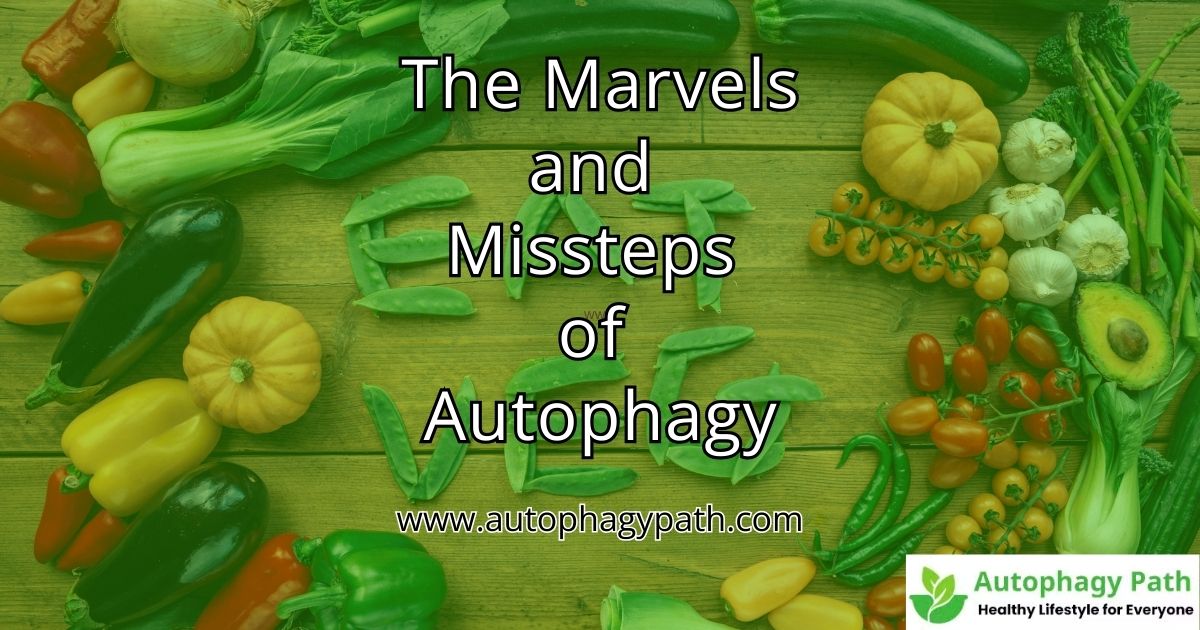6 Facts You Should Know About Autophagy Fast
For unlocking vital health, it takes 6 Facts You Should Know About Autophagy Fast. You should know them what they are to understand optimal health potential?
Welcome, health enthusiasts! In the quest for optimal well-being, we often stumble upon groundbreaking scientific discoveries that hold the promises of transformative health benefits. One such discovery is autophagy, a natural cellular process with profound implications for longevity and vitality. However, before delving into this realm of induced autophagy fasting, and autophagy fasting benefits, it is imperative to grasp six fundamental facts that can shape your journey toward a healthier, more resilient you to induce autophagy.
Table of Contents
6 Facts You Should Know About Autophagy Fast
In other words, in one way or another, in today’s fast-paced world, where convenience often takes precedence over health, it is easy to overlook crucial aspects of well-being. It is one more time reemphasised that one such aspect gaining traction in health circles is autophagy, a process that garnered the Nobel Prize in 2016. However, diving into an autophagy fast without understanding essential facts can lead to missed opportunities for robust health. This blog intends to shed light on six crucial facts that individuals should know before venturing into autophagy fast.

Key Facts to Consider Before Starting an Autophagy Fast:
Understanding Autophagy: Autophagy, derived from the Greek words “auto” (self) and “phagy” (eating), refers to the body’s ability to remove damaged cells and regenerate new ones. Maintaining cellular health has been linked to longevity and disease prevention.
Importance of Balanced Nutrition: While autophagy fasting emphasises cellular cleansing, it is crucial not to overlook the importance of balanced nutrition. Opting for whole foods rich in nutrients supports overall health and complements the 6 facts you should know about autophagy fast benefits.
Moderation in Exercise: Engaging in moderate exercise promotes circulation, enhances cellular function, and complements the effects of autophagy. The performance of yoga is one among them. However, excessive exercise can lead to oxidative stress, highlighting the importance of finding a balance that suits your body’s needs.
Quality Sleep for Cellular Repair: Adequate sleep is essential for cellular repair and regeneration. Aim for 6 to 8 hours of quality sleep each night to optimize the benefits of autophagy and promote overall well-being.
Stress Management: Chronic stress can impair cellular function and hinder autophagy. Incorporate stress-reducing practices such as mindfulness, meditation, and relaxation techniques to support optimal cellular health.
Consultation with Healthcare Professionals: Before embarking on any significant dietary or lifestyle changes, consult with healthcare professionals, especially if you have underlying health conditions or are taking medications to get the health benefits of 6 facts you should know about autophagy fast.
Benefits of Incorporating Autophagy into a Holistic Health Regimen:
Cellular Renewal: Autophagy promotes cellular renewal by clearing out damaged components, cellular function, and longevity.
Anti-Aging Effects: The rejuvenating effects of autophagy can slow down the aging process, promoting a youthful appearance and vitality.
Disease Prevention: By removing dysfunctional cells and promoting cellular health, autophagy comes to the rescue in preventing various diseases, including neurodegenerative conditions and cancer.
Metabolic Health: Autophagy supports metabolic health by enhancing insulin sensitivity, promoting healthy weight management, and reducing inflammation.
Enhanced Immunity: A well-functioning autophagy process strengthens the immune system, making the body more resilient to infections and illnesses.
Practical Tips for Implementing Autophagy Safely and Effectively:
Gradual Transition: Start by gradually incorporating fasting periods into your routine, allowing your body to adapt to autophagy.
Hydration: Stay hydrated during fasting to support cellular detoxification and overall well-being.
Nutrient-Dense Foods: Focus on consuming nutrient-dense foods during non-fasting periods to provide essential nutrients for cellular health.
Intermittent Fasting Patterns: Experiment with different intermittent fasting patterns to find what works best for your body and lifestyle.
Mindful Eating: Practice mindful eating to enhance digestion, nutrient absorption, and overall awareness of food choices.
Listen to Your Body: Pay attention to your body’s signals and adjust your fasting and eating patterns to ensure sustainability and long-term benefits.
Let us delve deeper into autophagy and its implications for long-term health without repeating the previously covered areas and circumventing around the bushes.

Understanding Autophagy:
Autophagy is a natural cellular process to promote health and longevity. At its core, autophagy involves the recycling and removal of damaged or dysfunctional cellular components, such as proteins and organelles, through a carefully orchestrated series of steps. Through strategies such as intermittent fasting and a ketogenic meal plan, which induce a state of ketosis and promote autophagic activity, autophagy becomes leverage-able.
When autophagy is activated, cells undergo a process of self-cleansing, breaking down unnecessary or harmful elements and recycling them into new building blocks. This process helps maintain cellular health’s crucial role in cellular renewal and regeneration.
Cellular Renewal and Longevity:
One of the key benefits of autophagy is its ability to promote cellular renewal and longevity. By removing damaged components and promoting the synthesis of new ones, autophagy helps cells function optimally and resist the effects of aging.
Studies have shown that enhancing autophagy can extend lifespan in various organisms, including mice and nematode worms. While the direct impact on human lifespan is still under investigation, the potential for autophagy to support healthy aging is promising.
Mitochondrial Health and Energy Production:
Autophagy in maintaining mitochondrial health is considered the powerhouse responsible for energy production. Dysfunctional mitochondria can lead to energy deficits and contribute to various age-related conditions.
Through selective autophagy, damaged mitochondria can be targeted for removal, allowing for the synthesis of new, healthy mitochondria. This process not only supports cellular energy production but also helps protect cells from oxidative stress and damage.
Neurological Benefits:
The benefits of autophagy extend beyond cellular health to neurological well-being. Autophagy is in the clearance of toxic protein aggregates associated with neurodegenerative diseases such as Alzheimer’s and Parkinson’s.
By promoting the clearance of these toxic proteins, autophagy may help protect neurons from degeneration and improve cognitive function. Research in this area is ongoing, highlighting the potential therapeutic implications of autophagy modulation for neurological disorders.
Immune System Support:
Strengthening immunity takes precedence over all other areas of health acquisition parameters. Autophagy plays a critical role in immune cell function by facilitating the removal of pathogens and supporting immune cell survival.
Enhanced autophagy has improved immune responses and increased resistance to infections. Strategies to boost autophagy, such as intermittent fasting or specific dietary interventions, may support resilience.
Metabolic Health and Weight Management:
Autophagy intersects with metabolic health in insulin sensitivity, glucose regulation, and lipid metabolism. Dysregulation of autophagy has metabolic disorders such as diabetes and obesity.
Autophagy may contribute to improved metabolic outcomes and healthy weight management. Incorporating strategies that enhance autophagy, such as time-restricted eating or nutrient modulation, can support metabolic well-being.
Environmental Stress Response:
Cells become constantly exposed to environmental stressors, including oxidative stress, toxins, and pathogens. Autophagy, a cellular defense mechanism, helps cells adapt to and cope with these stressors.
Autophagy enhances the cell’s resilience to environmental challenges. This adaptive response is crucial for overall health and vitality, especially in the face of modern-day stressors to get the health benefits of 6 facts you should know about autophagy fast..
Age-Related Disease Prevention:
Many age-related diseases, such as cardiovascular disease, neurodegenerative disorders, and certain cancers, have been linked to cellular dysfunction and damage. Autophagy’s role in maintaining cellular health and resilience positions it as a potential disease prevention and intervention.
Research suggests that modulating autophagy pathways through lifestyle interventions or pharmacological agents may offer therapeutic benefits for age-related diseases. Studies conducted on foodrestricted mice are among them. However, further studies are needed to elucidate the precise mechanisms and optimal strategies for autophagy modulation in disease prevention.
Personalized Approaches to Autophagy Optimization:
While autophagy offers profound health benefits, it is essential to recognize that individual responses may vary. Genetics, age, lifestyle, and overall health status can influence autophagy pathways and their outcomes to derive the health benefits of 6 facts you should know about autophagy fast.
Personalized approaches to autophagy optimization may involve tailoring dietary patterns, exercise regimens, and lifestyle practices to individual needs and goals. Consulting with healthcare professionals or specialists knowledgeable in autophagy modulation can provide valuable insights and guidance.
The Future of Autophagy Research and Applications:
As our understanding of autophagy deepens, the potential for its therapeutic applications continues to expand. From anti-aging interventions to disease prevention strategies, autophagy holds promise as a cornerstone of holistic health and wellness to influence the health benefits of 6 facts you should know about autophagy fast.
Future research efforts will likely focus on unraveling the intricate mechanisms of autophagy, identifying novel targets for intervention, and exploring innovative approaches to enhance autophagy safely and effectively. By staying informed and engaged in autophagy research to enable the health benefits of 6 facts you should know about autophagy fast, individuals can contribute to advancing knowledge and harnessing the full potential of this cellular process for improved health outcomes.
This exploration provides a comprehensive overview of the multifaceted benefits of autophagy and underscores the importance of incorporating informed choices into a holistic approach to health and well-being to elucidate the health benefits of 6 facts you should know about autophagy fast..
Frequently Asked Questions
The duration required to trigger autophagy through fasting can vary but typically begins after about 12 to 16 hours of fasting. For more significant autophagic activity and cellular rejuvenation, longer fasts of 24 to 48 hours or intermittent fasting protocols like 16/8 (16 hours fasting, 8 hours eating) may be more effective. Individual factors such as age, metabolic health, and activity level can also influence the onset of autophagy during fasting.
The five stages of autophagy are initiation, elongation, maturation, fusion, and degradation. In the initiation stage, autophagy gets called the phagophore. During elongation, the phagophore expands and engulfs cellular components targeted for degradation. Maturation involves the closure of the autophagosome, forming a double-membrane vesicle. Fusion with lysosomes occurs in the fusion stage, enabling the breakdown of contents by lysosomal enzymes. Finally, degradation involves the breakdown of engulfed materials and the recycling of cellular components.
Autophagy is a cellular process that removes damaged components and recycles them for cellular renewal. It aids in maintaining cell health, supporting longevity, and preventing diseases. Factors like fasting, exercise, and a balanced diet can enhance autophagy, promoting overall well-being.
Autophagy offers eight benefits:
Cellular Renewal: Removes damaged cells, promoting cellular regeneration.
Longevity: Supports healthy aging and extends lifespan.
Mitochondrial Health: Enhances energy production and reduces oxidative stress.
Neurological Protection: Clears toxic proteins linked to brain disorders.
Immune Boost: Strengthens immune function, aiding in infection resistance.
Disease Prevention: Reduces risks of age-related diseases like Alzheimer’s and cancer.
Metabolic Health: Improves insulin sensitivity and supports weight management.
Stress Resistance: Helps cells adapt to environmental stressors, promoting resilience.
Conclusion: Empowering Readers for Long-Term Health:
In conclusion, embarking on an autophagy fast can be a transformative journey toward optimal health and longevity to get the optimal health benefits of 6 facts you should know about autophagy fast. By understanding the essential facts outlined in this blog, you make informed choices that prioritize your well-being. Remember, it is not just about intermittent fasting or specific dietary trends; it is about embracing a holistic approach that encompasses balanced nutrition, regular exercise, quality sleep, stress management, and the profound benefits of autophagy. Here is to unlocking vital health and thriving in the long run!






